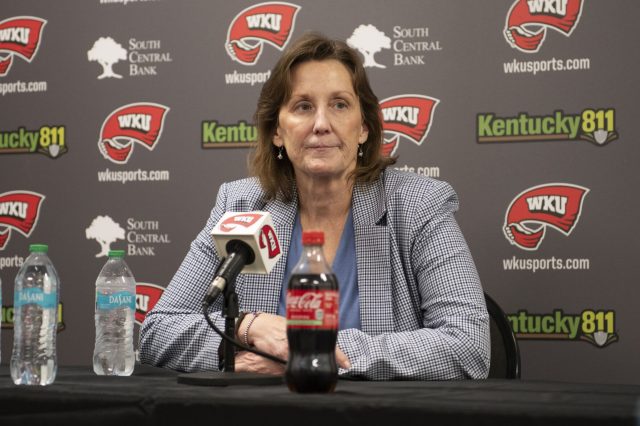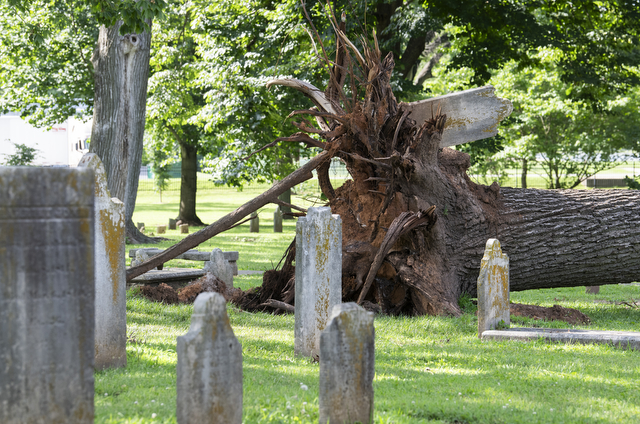ADEPTLY ADAPTABLE: CUSA commissioner keeps options open for league
Published 8:49 pm Friday, November 1, 2024

- Conference USA Commissioner Judy MacLeod speaks during a news conference during halftime at the WKU-Kennesaw State football game Wednesday night at Houchens-Smith Stadium. JACK DOBBS / jack.dobbs@bgdailynews.com
JEFF NATIONS / jeff.nations@bgdailynews.com
Judy MacLeod has seen plenty of changes over nearly 20 years of association with Conference USA.
MacLeod, who has been CUSA’s commissioner since 2015, joined the league as executive associate commissioner in 2006 just after initial exodus of schools in what has become a recurring scenario – Cincinnati, Louisville, South Florida, DePaul and Marquette went off to the Big East, Charlotte and Saint Louis headed out to the Atlantic 10, and TCU joined the Mountain West.
CUSA rebuilt then, and has rebuilt several times since.
So when UTEP – one of those original replacements in 2005 after the first upheaval – announced plans in October to join the Mountain West and leave CUSA with 11 members in 2025-26, MacLeod was not taken by surprise – when realignment happens, Conference USA often has a domino or two involved in the process.
With a pair FBS newcomers set to join CUSA in July as Delaware and Missouri State become the latest schools to make the join from the FCS level, the conference is preparing to enter the 2025-26 school year with 11 full-time members.
“We’ve been at 11 before, so I think our sports services staff that do schedules every year are kind of like could you just get to a number and stay there so we can have some consistent scheduling, but we feel really good with the 11 we have right now,” MacLeod said during a news conference held during halftime of Western Kentucky’s home football game against Kennesaw State on Wednesday night at Houchens-Smith Stadium. “We’ll always examine it. Our board, the presidents are really active in that space. But right now … I guess we could walk out of here and an hour later, something else might happen in the country, but right now we feel good about it.”
That’s not to say CUSA isn’t interested in further additions if it makes sense for the league. MacLeod said CUSA looks at 30 date points in evaluating prospective members, everything from a tradition of success to a commitment to athletics.
“Kennesaw, for example, they have 47,000 students and they have a ton of potential,” MacLeod said. “Next year we’ll add Missouri State and Delaware. Obviously everyone knows that, but they become official July 1 and they’re both having great years. So we feel good about what we’ve rebuilt. Again, it was an interesting time but really like the group we have now.
“ … Finding the right fit’s important. There’s some great schools out there that we’ll always continue to look at and see if something makes sense as they continue to develop. This conference has had a rich tradition of bringing people in.”
Since WKU joined CUSA after departing the Sun Belt Conference in 2014, the league membership is radically different – gone are UAB, Florida Atlantic, Marshall, Charlotte, North Texas, Old Dominion, Rice, Southern Miss and UTSA. Only Florida International, Middle Tennessee and Louisiana Tech – which all joined just months before WKU – have been in the league longer than Western Kentucky after UTEP departs.
During the latest major round of reconstituting CUSA when it seemed the league might not survive, WKU played a leading role in holding the conference together as it added Liberty, New Mexico State, Sam Houston State and Jacksonville State, with Kennesaw State coming aboard a year later and Delaware and Missouri State on the way.
“This facility (WKU’s new football press box) and what they’ve done with all the facilities, the commitment here – you look at the leadership, from (WKU athletic director) Todd Stewart to President (Timothy) Caboni … Dr. Caboni chaired our board for two and a half years, almost three years. Todd was our chair last year – they’re a tremendous part of Conference USA,” MacLeod said. “Their leadership in the rooms with our ADs, our presidents, our coaches … Western Kentucky brings so much to us. So I think things were crazy for awhile and they may be crazy again, so we’ll just see what happens but WKU is really important to us.”
TOUGH GEOGRAPHY
As presently constituted and perhaps even more so next year with the new additions, CUSA makes for an odd geographic alignment of schools. That isn’t new for the conference either and something MacLeod thinks can continue to work for its members.
“A lot conferences these days are kind of odd footprints,” MacLeod said. “We’re certainly not the outlier there. The geography part is a tough conversation. We’ve talked a ton about some regional scheduling initiatives in sports other than football and basketball. We’ll continue to work on that.
“And then I think finding the right fit, if we were to add down the road, is super important. My phone continues to ring and so that’s a good thing; people want to be a part of Conference USA. But we’ll do the best job that we can to work with the geography that we have. That’s what we have right now and we’ll figure it out. It would be great if somewhere down the line we did a bunch of things that made a lot of common sense in college athletics, but we’ll deal with the geography that we have.”
Moving the CUSA basketball tournaments to Huntsville, Alabama, last season after a run of five years at Ford Center at The Star in Frisco, Texas – the 2020 tournaments were canceled due to the COVID-19 pandemic – proved popular with at least the eastern contingent of CUSA, WKU and MTSU in particular. Huntsville’s Probst Arena provides a neutral-site venue accessible to fans of most of the league’s membership and MacLeod thinks the three-year agreement with an option for a fourth year has been beneficial to CUSA. All other CUSA championships are currently held with member schools serving as host sites.
“Huntsville was great Year 1,” MacLeod said. “I think we learned a lot of what we can build on down there. We’ll play there this year and next year, we’re contracted to do that and then we’ll see where we are after that. I think Year 1 was especially good because (WKU) fans came and Middle Tennessee fans came, so having each of you in a championship game was great for the crowd. We need to develop the Huntsville community as well and get them to come to the games.
“Football is probably going back to geography – hard to pick a spot that we can get fans to travel to, so right now we feel good about hosting on a home campus but we’ll never not look at it. It’s always a topic of conversation. We’ve done some neutral-site baseball in the past and if we found the right spot we would consider that again, but again all those decisions are membership decisions. Right now it’s good that we can rotate some around and see other campuses and give people the opportunity to host.”
STAYING RELEVANT
Keeping CUSA nationally relevant remains a focus for MacLeod and her staff – Wednesday night’s football game served as an example as WKU played a mid-week game on national television for the third time in October, an arrangement that Conference USA is now in Year 2 of in a five-year deal with an option for a sixth year of non-traditional football nights.
“Everybody’s starting to try to find a window for themselves,” MacLeod said. “I have to give our coaches a ton of credit because when we first started talking about doing this we went to our coaches. It upsets … football is very structured in what they do on weekly basis, so it upsets that. But our coaches were all in. If it’s going to help the league, then that’s what we want to do.
“The exposure that Kennesaw got last week (with an upset win of previously unbeaten Liberty) … if that game’s on a Saturday and buried, it’s still a national headline because of what they did but they don’t get nearly what they got on a weekday. I think our fan bases are adjusting, our students have been great coming out to games, but the exposure that we’re getting for our programs – especially when we’re a relatively new group together – to build that and show the country what we’re all about, the exposure’s been just fantastic.”







